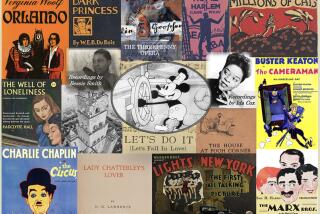Editorial: Yet again, the Supreme Court should protect ‘offensive’ trademarks
- Share via
The Supreme Court on Monday considered whether a line of clothing whose name sounds a lot like a four-letter vulgarity beginning with the letter F can be denied federal trademark registration because it’s “scandalous” or “immoral.” If the justices value the 1st Amendment they will rule — as they did in a related case two years ago — that government officials may not refuse to register a trademark simply because many people might find it offensive.
In the 1990s, a Los Angeles entrepreneur and artist named Erik Brunetti founded a clothing brand called FUCT. But when he tried to register that name for federal trademark protection, the U.S. Patent and Trademark Office denied his petition. It cited language in a federal law known as the Lanham Act directing the agency not to register trademarks containing “immoral” or “scandalous” material. That ruling was upheld by the Trademark Trial and Appeal Board.
The denial had significant economic consequences. Without federal registration, Brunetti was ineligible for several protections afforded by federal registration, including the assistance of Customs and Border Protection in restricting importation into the United States of knockoffs of his products.
Enter the Fray: First takes on the news of the minute »
It’s hard to dispute the conclusion of the Trial and Appeal Board that the name Brunetti chose for his company is the “phonetic equivalent” of the past tense of the F word. That probably explains why the justices at Monday’s argument were careful not to say the actual name. Chief Justice John G. Roberts Jr. referred to the “vulgar word at the heart of the case.”
The Trial and Appeal Board’s decision was overturned by the U.S. Court of Appeals for the Federal Circuit, which said that the statute’s ban on “immoral” and “scandalous” trademarks “impermissibly discriminates based on content in violation of the 1st Amendment.” The Supreme Court should affirm that court’s ruling.
In 2017 the justices struck down another part of the Lanham Act banning the registry of trademarks that might “disparage . . . persons, living or dead, institutions, beliefs, or national symbols.” That case involved an Asian American band called the Slants, which said it chose its name as a way to redeem a word traditionally regarded as a racial slur.
No two cases are identical. But it would be bizarre if the court, having struck down the disparagement clause in the Lanham Act, upheld the law’s ban on “scandalous” trademarks. Both provisions involve the government granting a benefit based on subjective decisions about whether a name is offensive. A divergent opinion in this case would inevitably will lead to what Justice Brett M. Kavanaugh called “erratic or inconsistent enforcement.” The way to prevent such haphazard decision making is to take the patent office out of the censorship business.
Follow the Opinion section on Twitter @latimesopinion and Facebook
More to Read
A cure for the common opinion
Get thought-provoking perspectives with our weekly newsletter.
You may occasionally receive promotional content from the Los Angeles Times.






